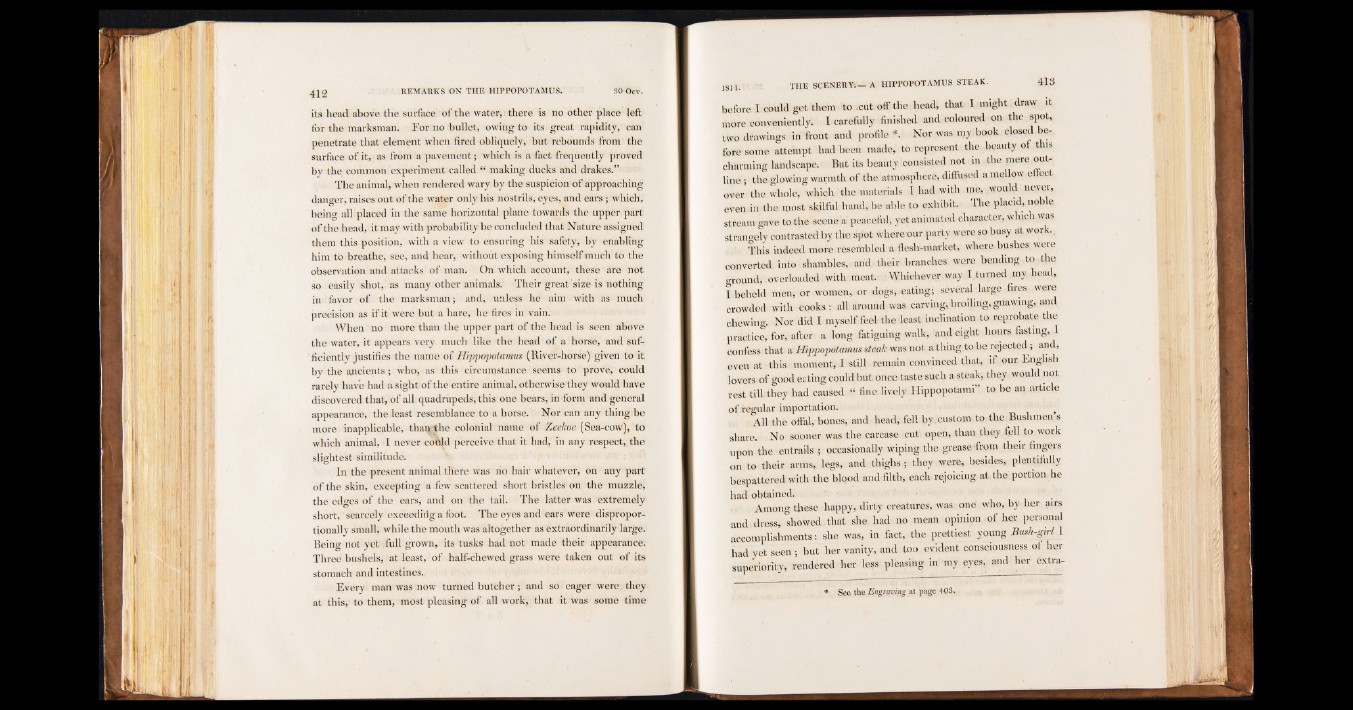
its head above the surface of the water, there is no other place left
for the marksman. For no bullet, owing to its great rapidity, can
penetrate that element when fired obliquely, but rebounds from the
surface of it, as from a pavement; which is a fact frequently proved
by the common experiment called “ making ducks and drakes.”
The animal, when rendered wary by the suspicion of approaching
danger, raises out of the water only his nostrils, eyes, and ears; which,
being all placed in the same horizontal plane towards the upper part
of the head, it may with probability be concluded that Nature assigned
them this position, with a view to ensuring his safety, by enabling
him to breathe, see, and hear, without exposing himself much to the
observation and attacks of man. On which account, these are not
so easily shot, as many other animals. Their great size is nothing
in favor of the marksman; and, unless he aim with as much
precision as if it were but a hare, he fires in vain.
When no more than the upper part of the head is seen above
the water, it appears very much like the head of a horse, and sufficiently
justifies die name of Hippopotamus (River-horse) given to it
by the ancients; who, as this circumstance seems to prove, could
rarely have had a sight of the entire animal, otherwise they would have
discovered that, of all quadrupeds, this one bears, in form and general
appearance, the least resemblance to a horse. Nor can any thing be
more inapplicable, than the colonial name of Zeekoe (Sea-cow), to
which animal, I never cofvld perceive that, it had, in any respect, the
slightest similitude.
In the present animal there was no hair whatever, on any part
of the skin, excepting a few scattered short bristles on the muzzle,
the ed«res of the ears, and on the tail. The latter was extremely
short, scarcely exceeding a foot. The eyes and ears were dispropor-
tionally small, while the mouth was altogether as extraordinarily large.
Being not yet full grown, its tusks had not made their appearance.
Three bushels, at least, of half-chewed grass were taken out of its
stomach and intestines..
Every man was now turned butcher; and so eager were they
at this, to them, most pleasing of all work, that it was some time
1311. THE SCENERY-.— A HIPPOPOTAMUS STEAK. 413
before I could get them to .cut off the head, that I might draw it
more conveniently. I carefully finished and coloured on the spot,
two drawings in front and profile *. Nor was my book closed before
some attempt had been made, to represent the beauty of this
charming landscape. But its beauty consisted not in the mere outline
; the glowing warmth of the atmosphere, diffused a mellow effect
over the whole, which the materials I had with me, would never,
even in the most skilful hand, be able to exhibit. The placid, noble
stream gave to the scene a peaceful, yet animated character, which was
strangely contrasted by the spot where our party were so busy at work.
This indeed more resembled a flesh-market, where bushes were
converted into shambles, and their branches were bending to the
ground, overloaded with meat. Whichever way I turned my head,
I beheld men, or women, or dogs, eatings several large fires were
crowded with cooks : all around was carving, broiling, gnawing, and
chewing. Nor did I myself feel the least inclination to reprobate the
practice, for, after a long fatiguing walk, and eight hours fasting, I
confess that a Hippopotamus steak was not. a thing to be rejected; and,
even at this moment, I still remain convinced that, if our English
lovers of good eating could but once taste such a steak, they would not
rest till they had caused “ fine lively Hippopotami” to be an article
of regular importation. ' ' ',
All the offal, bones, and head, fell by . custom to the Bushmen s
share. No sooner was the carcase cut open, than they fell to work
upon the entrails ; occasionally wiping the grease from their fingers
on to their arms, legs, and thighs; they were, besides, plentifully
bespattered with the blood and filth, each rejoicing at the portion he
had obtained.
Among these happy, dirty creatures, was one who, by her airs
and dress, showed that she had no mean opinion of her personal
accomplishments: she was, in fact, the prettiest young Bush-girl I
had yet seen ; but her vanity, and too evident consciousness of her
superiority, rendered her less pleasing in my eyes, and her extra-
# See the Engraving at page 4-OS.